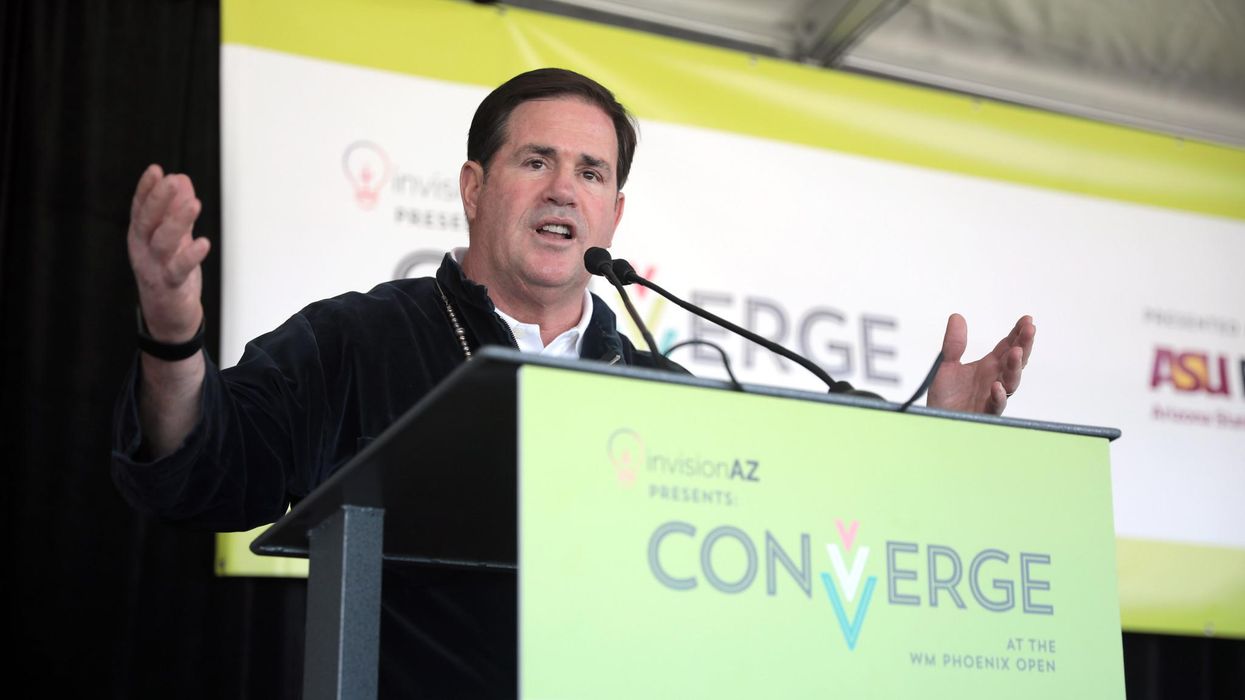Editor's note: This story was updated with information about a lawsuit filed Thursday in Arizona.
When Arizona Gov. Doug Ducey signed into law proof-of-citizenship voting requirements, he set the stage for another federal court battle on the issue. Legislators in other states have considered similar legislation but so far none have advanced as far as Arizona’s changes.
The new law retroactively requires all voters to provide proof of citizenship, even those who are already registered to cast ballots in the state, updating a 2004 provision that only put that burden on new voters.
Opponents of the new law say as many as 190,000 people may be removed from the voter rolls because no such requirement existed when they registered. They would need to re-register, but might not be aware of the change in their status.
Lawmakers in a handful of other states also have been pushing voter registration changes tied to citizenship this year.
This isn’t a new fight
Under federal law, people registering to vote must attest that they are citizens, but they are not required to provide any proof of their status. States may impose their own citizenship requirements for state and local elections, and a few have done so but only Arizona has put it into practice.
Since 2004, Arizona has required people registered to vote to include proof of citizenship, but the Supreme Court ruled in 2013 that the state cannot require such documentation from people who use the federal voter registration form. Therefore, Arizonans who use the federal form may not vote in state and local elections.
An attorney for the state House told lawmakers the new requirements violate federal law, and a lawsuit was filed Thursday morning in U.S. District Court.
"This is an obvious attempt by Arizona Republicans to limit access to voting, but we’ll fight to ensure that no voter is wrongly disenfranchised," said Marc Elias, a Democratic lawyer who filed the case on behalf of the civic engagmeent group Mi Familia Vota.
In 2016, Alabama, Georgia and Kansas asked the Election Assistance Commission to add a proof-of-citizenship requirement to the federal voter registration form. The case went to federal court, which put a stop to the request.
Proponents of requiring documentary proof of citizenship say such laws are critical to fending off voter fraud, even though instances of illegal voting are rare and do not impact election outcomes.
Opponents say these laws can actually prevent some eligible citizens from voting because they may not possess the required documentation.
“Those most likely to be affected by these laws are students, the elderly, the disabled, low-income individuals, the homeless, and naturalized citizens,” Stuart Naifeh, a former senior counsel at the liberal think tank Demos, wrote in 2014. Aside from these narrow populations, across the board, Native Americans, African Americans and members of other historically disadvantaged and disenfranchised groups are also less likely to have, or have ready access to, documents that will satisfy documentary proof-of-citizenship requirements.”
Other bills being considered
In Mississippi, Republican lawmakers had been on the verge of advancing legislation that would have put into place aggressive measures to purge voter rolls of noncitizens. But just prior to a vote in the state House, Republicans amended the bill to soften the language and make it harder to cancel a voter’s registration.
When GOP lawmakers determined the bill would be bad for democracy, they agreed to the change, according to the Clarion Ledger.
That bill has been passed by both chambers and awaits the governor’s signature.
In Idaho, the House has passed a bill that would require people registering to vote on Election Day to provide proof of citizenship. Voter registration in Idaho requires a driver’s license or Social Security number, but a license can be obtained by non-citizens. The state enacted a law in March that adds a “citizenship” notation to driver’s licenses.
In 2020, more than 87,000 people registered to vote on Election Day in Idaho, accounting for approximately 10 percent of the ballots cast.
The bill was passed by the House on March 14 and has been referred to a Senate committee for consideration.
Legislators in at least two other states have attempted to impose new citizenship requirements, but their proposals did not advance.
In Oklahoma, language was removed from a bill that would have required all registered voters to re-register and provide proof of U.S. citizenship. Anyone who did not do so would only be permitted to vote in federal elections Election Secretary Paul Ziriax convinced lawmakers that such a requirement would be expensive, possibly unconstitutional and a heavy burden on voters, according to Oklahoma Watch.
And in Washington, a bill to require all registered voters to provide proof of citizenship failed to advance out of a House committee.
Other bills have been introduced in Louisiana, Missouri, New York, Pennsylvania and South Carolina, according to the Voting Rights Lab's legislation tracker.




















Trump & Hegseth gave Mark Kelly a huge 2028 gift